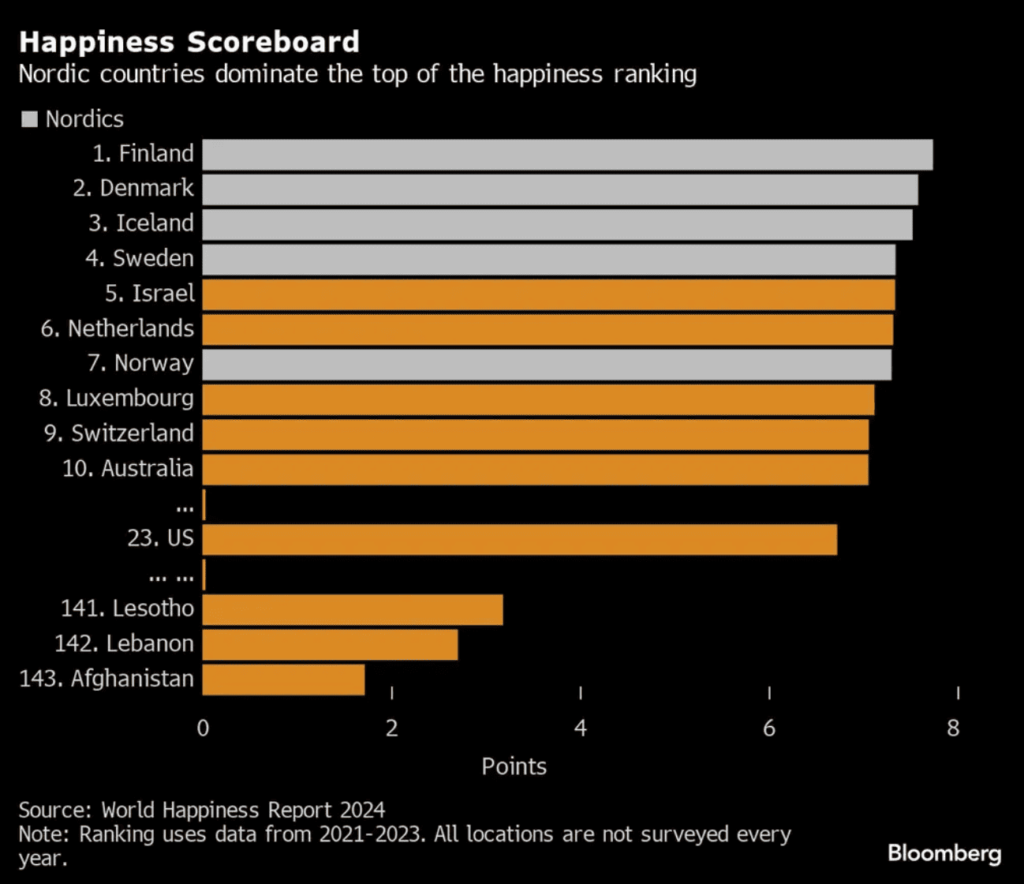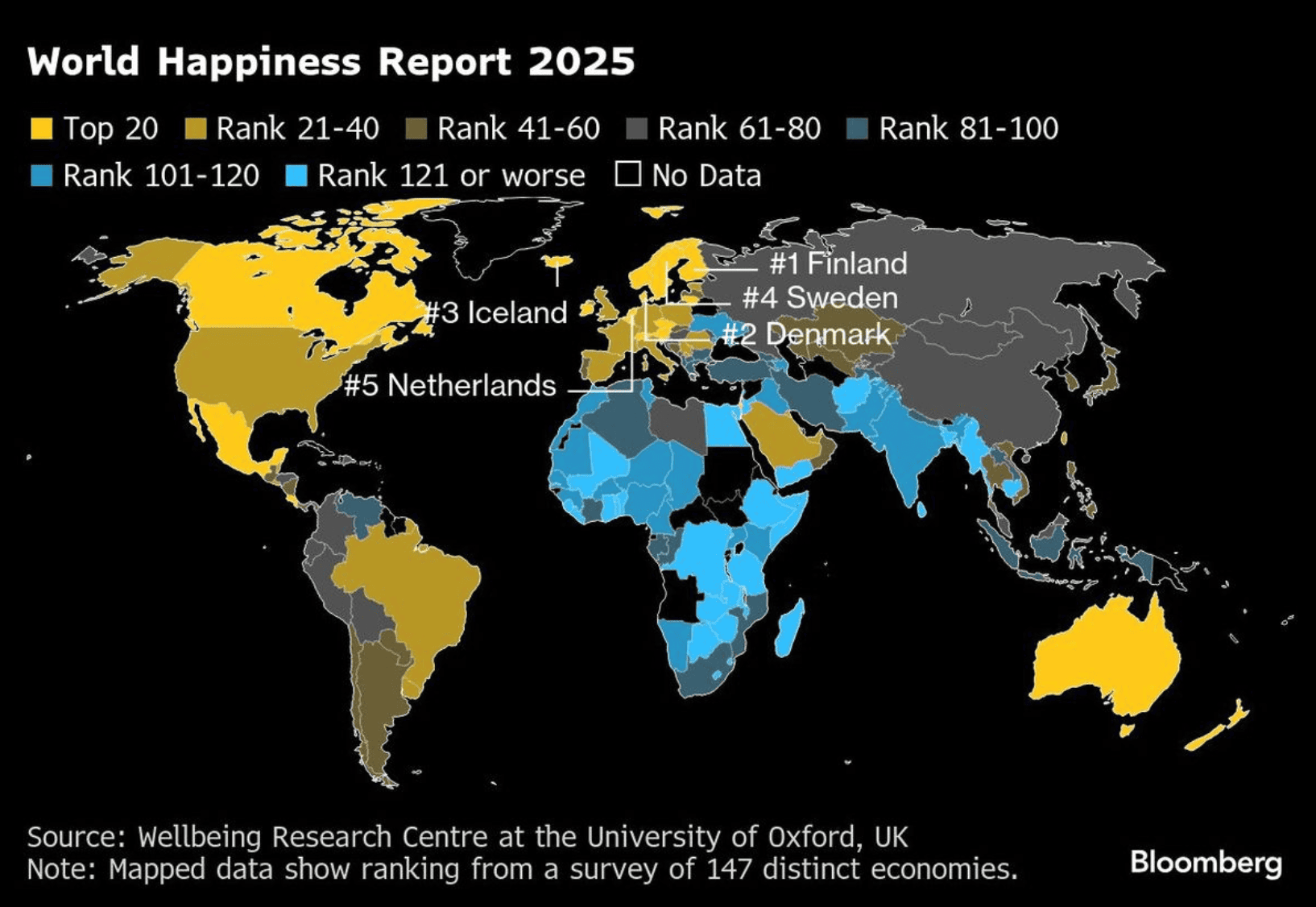According to the 2025 World Happiness Report, Finland has maintained its position as the happiest country globally for the eighth consecutive year, while the United States has dropped to its lowest-ever ranking at 24th place, reflecting significant shifts in global well-being and social dynamics.
Finland’s Happiness Leadership Explained

Why Finland Consistently Ranks as the Happiest Country in the World
Finland often ranks at the top of the World Happiness Report. This is no coincidence. The country excels in several key areas that contribute to overall well-being and life satisfaction.
- Finland has a high level of social trust. People believe that others will do the right thing, even strangers. If someone loses a wallet, they expect it to be returned. This strong sense of trust creates a feeling of safety and reduces daily stress. Many other countries struggle with low trust, which affects happiness. Learn more about Finland’s social trust.
- Work-life balance is a priority in Finland. The average workweek is 37.5 hours, giving people time to enjoy personal activities and family life. Finnish companies value efficiency over long hours. Employees are encouraged to take breaks, and vacations are seen as essential for well-being. A balanced work culture improves job satisfaction and mental health. Explore Finland’s work culture.
- Finland’s social support system is strong. The government provides free healthcare and education, and parental leave is generous. People know they can rely on welfare programs during difficult times. This reduces financial stress and allows individuals to focus on their personal growth and happiness. Read more about Finland’s welfare system.
- Nature is an important part of Finnish life. The country is covered with forests and lakes, and outdoor activities are common. Many Finns take daily walks, swim in lakes, or relax in saunas. Spending time in nature helps lower stress, improve mental health, and increase life satisfaction. Discover Finland’s natural beauty.
Finland’s happiness does not come from wealth alone. It comes from trust, balance, support, nature, and fairness. These factors create a society where people feel secure, valued, and fulfilled. Many countries could learn from Finland’s approach to improving happiness and quality of life.
US Decline in Global Rankings

Why the U.S. Is Experiencing a Happiness Recession
The United States has dropped to its lowest position ever in the World Happiness Report. This decline signals a deepening crisis in well-being, especially for younger Americans. If only those under 30 were considered, the U.S. wouldn’t even rank in the top 60 happiest countries. Several key factors explain this sharp decline.
Social isolation is increasing at an alarming rate. Nearly one in five young adults reported having no one to rely on for support in 2023. Fewer close friendships and declining community engagement have left many people feeling disconnected. A lack of strong social bonds is linked to higher stress, loneliness, and mental health struggles. Learn more about social isolation.
Americans are eating alone more than ever. Since 2003, the number of people dining alone has surged by 53%. Shared meals, once a cornerstone of social life, are becoming rare. Eating together fosters connection and emotional well-being, but many now opt for quick, solitary meals. This shift reflects deeper societal changes, including busier schedules and a rise in screen time during meals. Read more about the impact of solitary dining.
Trust in others is at an all-time low. In the 1970s, half of Americans said they trusted others. Today, that number has fallen to just 30%. Without trust, relationships suffer, communities weaken, and cooperation declines. Societies with higher trust levels tend to have lower crime rates, better mental health, and stronger economies. The erosion of trust makes daily life more stressful and uncertain. Find out how trust affects well-being.
Economic inequality remains a major problem. Compared to Nordic countries, the U.S. experiences greater disparities in income, healthcare access, and education. People in lower-income groups report higher stress and lower life satisfaction. Countries with lower inequality, like Finland and Denmark, consistently rank higher in happiness. A sense of fairness and opportunity plays a big role in overall well-being. Learn how economic inequality affects happiness.
Social Trust and Nordic Success

Why Social Trust Makes Nordic Countries the Happiest in the World
Nordic countries consistently rank among the happiest in the world. One key reason is their high levels of social trust. Finland, in particular, stands out as a society built on trust, cooperation, and shared values.
Institutional trust is a major factor. In 2019, 64% of Finns said they trusted their government, compared to the OECD average of 45%. People believe that public institutions act in their best interest. This confidence makes policies easier to implement and strengthens social stability. Learn more about Finland’s governance.
Interpersonal trust is also remarkably high. Studies show that Nordic countries have the highest rates of both expected and actual wallet returns. If someone drops a wallet, they can trust that a stranger will return it. This strong faith in others creates a sense of security and social cohesion. Read about trust in Nordic societies.
Social trust played a crucial role during the COVID-19 pandemic. Finland’s citizens largely followed public health guidelines without strict enforcement. High trust in government and science led to widespread compliance, reducing economic and social disruptions. In contrast, countries with low trust faced resistance, misinformation, and slower recovery. Discover how trust shaped Finland’s COVID-19 response.
The Nordic model proves that social capital strengthens national happiness. When people trust each other and their institutions, societies become more resilient. This trust fosters economic stability, better mental health, and a sense of belonging. Other nations can learn from Finland’s example to improve their own well-being and social harmony. Find out how trust impacts happiness.

